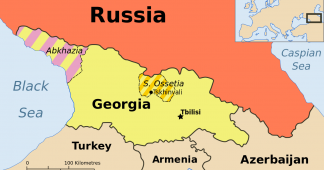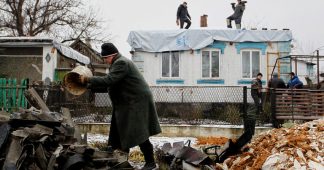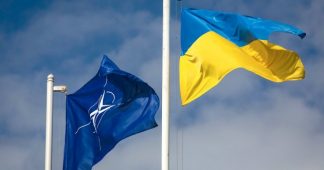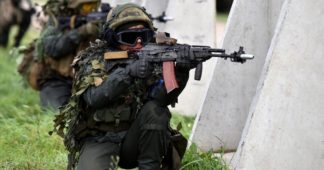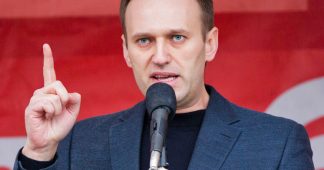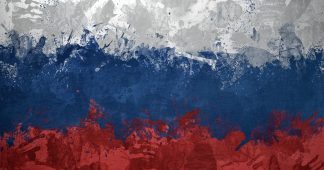Saakashvili thought Washington had his back, but just like today, the hawks made promises that cooler heads wouldn’t back up.
Andrew Cockburn
December 15, 2021
Current war-party bombast in the cause of Ukraine, supposedly menaced by massed hordes of Russian armored divisions, routinely evokes the 2008 war in the Caucuses in which, according to the tub-thumpers’ preferred narrative, Russia attacked Georgia without provocation only to be forced to withdraw thanks to Washington’s steely resolve. It is therefore worth recalling what actually happened.
Then, as now, the conflict was fueled at a fundamental level by the eagerness of the defense lobby to expand NATO eastwards, regardless of entirely predictable Russian reactions. By 2008, Moscow’s erstwhile eastern European satellites, once part of the defunct Warsaw Pact, had all been absorbed into NATO, despite earlier pledges by Western leaders that no such expansion would take place. Strategically emasculated in the Yeltsin years, Russia had grudgingly accepted the process with an ill-grace but could do little more than protest. By the 2000s, with the momentum of expansion carrying NATO ever closer to the Soviet heartland, it was no longer realistic to presume Russian indifference.
Yet the movement was hard to stop. In Georgia, a charismatic young U.S.-trained lawyer, Mikheil “Misha” Saakashvili, took power in 2003 and straightaway began offering a welcome embrace to Washington and requests to join the alliance. To bolster his standing in the American capital, Saakashvili hired Randy Scheunemann, a Republican lobbyist and the executive director of the Committee for the Liberation of Iraq, a neocon group formed in 2002 under the chairmanship of none other than Bruce Jackson, a senior Lockheed executive and president of the Committee to Expand NATO.
Privately, Washington players felt a little nervous about their hyperactive protégé, suspecting that he might get everyone into trouble. As one of them told me, Saakashvili “needed a course of Ritalin to shut him up.” But in public, it was easy to get swept away. In 2005, George W. Bush stood in Tbilisi’s Freedom Square and told the crowd they could count on American support:
“As you build a free and democratic Georgia, the American people will stand with you… As you build free institutions at home, the ties that bind our nations will grow deeper, as well. …We encourage your closer cooperation with NATO.”
Saakashvili worked hard at ingratiating himself with the friendly superpower, supplying a Georgian contingent for the U.S.-led coalitions in Iraq and Afghanistan, and offering hospitality to American intelligence operations in Georgia itself. Most obviously, NSA interception facilities began sprouting on suitably sited hilltops. Across Washington the Georgian president basked in bipartisan favor among influential figures such as Richard Holbrooke, as well as Senator John McCain whose close adviser was Saakashvili lobbyist Randy Scheunemann.
Unfortunately, the burgeoning relationship promoted a dangerous overconfidence on Saakashvili’s part. By 2008, he was unabashedly provoking Moscow, apparently confident that he could win a war with his immense neighbor. Receiving Bruce Jackson, who by now was heading up yet another entity, the Project on Transitional Democracies, Saakashvili demanded immediate shipment of various weapons systems, including, remembers Jackson, “a thousand Stingers.” Jackson said that would not happen. “Go f–k yourself,” snapped the Georgian leader.
Matters came to a head at a NATO summit in Bucharest in April 2008. Vladimir Putin flew in to say that the alliance’s expansion posed a “direct threat” to Russia. According to a former senior White House official who spoke to me, President Bush, accompanied by National Security Adviser Stephen Hadley, took Saakashvili aside and told him not to provoke Russia. Sources privy to the meeting tell me that Bush warned the Georgian leader that if he persisted, the United States would not start World War III on his behalf.
Bush had arrived in Bucharest eager for an agreement on rapid NATO membership for Georgia and Ukraine, but he backed off in the face of protests from European leaders. In an awkward compromise, NATO released a statement foreswearing immediate membership, but also stating: “We agreed today that these countries will become members of NATO.” Putin duly took note.
Buoyed by hubris and undeterred by warnings from Washington, Saakashvili pressed on, ultimately assaulting the separatist region of South Ossetia, which was under Russian control. “Misha,” Jackson told me later, “was trying to flip us into a war with Russia.” His confidence may have been buoyed by back-channel assurances from minions of Vice-President Richard Cheney that the U.S. would in the end come to his aid. Secretary of State Condoleezza Rice and National Security Adviser Stephen Hadley feared that Cheney might indeed persuade Bush to intervene. To ward off this possibility Hadley ordered his NSC aide Fiona Hill to station herself outside Cheney’s office and monitor his movements. If he emerged and appeared to be heading to the Oval Office, she was to call her boss and Rice immediately, so that they could sprint to Bush’s side and dissuade him from any dangerous notions dripped in his ear by the vice-president.
Meanwhile, Russian forces had swiftly counterattacked and were soon deep inside Georgian territory, making sure along the way to destroy all those U.S. listening posts. Having humiliated Saakashvili they then withdrew. Despite the underlying parallels between Georgia 2008 and Ukraine 2021, most obviously the poisonous chalice of aspirant NATO membership, here are important differences. In the words of a former senior White House official, who told me: “Saakashvili was a hotheaded megalomaniac. [Ukrainian President Volodymyr] Zelensky was elected on a peace platform but is being taunted as weak by his internal opposition.” In particular, noted the former official, Zelensky’s predecessor, Petro Poroshenko, in pursuit of a comeback, is challenging him to defy Putin. So, he added, are the “idiots” in Washington goading Zelensky and his military.
This article was adapted in part from Cockburn’s new book, The Spoils of War: Power, Profit, and the American War Machine (2021)
Published at responsiblestatecraft.org
We remind our readers that publication of articles on our site does not mean that we agree with what is written. Our policy is to publish anything which we consider of interest, so as to assist our readers in forming their opinions. Sometimes we even publish articles with which we totally disagree, since we believe it is important for our readers to be informed on as wide a spectrum of views as possible.
